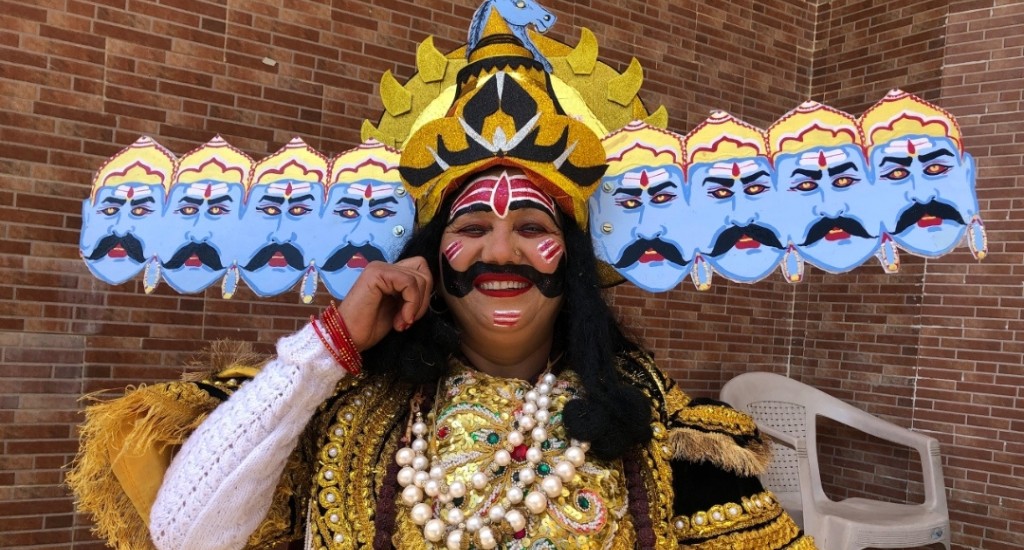
Meet the Ravan Didi of Uttarakhand
Munni Padiyar Bisht, an unassuming village woman from Chamoli district, metamorphoses into the formidable Ravan Didi through this women-led Ramlila in Uttarakhand.

Munni Padiyar Bisht, an unassuming village woman from Chamoli district, metamorphoses into the formidable Ravan Didi through this women-led Ramlila in Uttarakhand.
Her presence radiates warmth and charisma, captivating all who cross her path. Meet Munni Padiyar Bisht, a 54-year-old with an infectious smile, luminous eyes and a distinctive red bindi gracing her forehead. Behind her unpretentious facade lies an epical tale of transformation, and the embodiment of an extraordinary character — Ravan, the demon king from the Ramayana.
With each layer of clothing and stroke of makeup, she undergoes a metamorphosis, transcending from the humble Munni of Gaucher Panain village in Uttarakhand’s Chamoli district to the formidable Ravan Didi of the Himalayas.

Munni is part of Maa Nanda Mahila Ramlila Mangal Yog Samiti, an all-women initiative to promote yoga and local culture. This endeavour marks perhaps the first women-led Ramlila in Uttarakhand, challenging age-old traditions and breaking barriers. Traditionally dominated by men, the Ramlila was a male-centric affair, with even female roles enacted by men.
Munni’s journey unfolds within the confines of a dressing room, where she dons the garb of Ravan, step by step. As the transformation unfolds, her expressions shift, her demeanour transforms and her smile takes on new dimensions.
After an hour of meticulous preparation, Ravan Didi emerges in all her splendour — a commanding presence, brimming with laughter, chants, songs and a hint of menace. With 10 heads, fiery eyes and a formidable moustache veiling half her face, she commands the stage with the aura of Ravan.

Founded in 2015 by government school teacher Laxmi Shah from Chamoli, the Mahila Ramlila Samiti has taken their performances beyond Uttarakhand’s borders to captivate audiences across India. It has performed at 14 venues, including New Delhi and Ayodhya, leaving an indelible mark on the cultural landscape. Thousands of attendees, including Uttar Pradesh Chief Minister Yogi Adityanath, graced the Ramlila in Ayodhya in December 2023.
Born and raised in Rudraprayag, Munni often participated in dance and cultural programmes in her village and school. But her childhood aspirations of performing on stage took a backseat after marriage at 19, as household duties consumed her focus. Then, in 2017, a serendipitous encounter with Laxmi Shah reignited Munni’s passion for the stage.
“I played Draupadi in one of our programmes and rediscovered my love for acting. Since then, I’ve performed in front of thousands,” she said, reflecting on her journey.

Embracing the mantle of Ravan was unexpected for Munni, who initially aspired to portray Lord Ram. Yet, guided by Laxmi Shah’s wisdom, she accepted the complexity of Ravan’s character, transcending the stereotype of evil incarnate.
“People say playing Ravan runs in my blood,” Munni chuckled, recalling her brother and brother-in-law’s portrayal of the mythological king of Lanka in traditional Ramlilas. Embracing her newfound identity, Munni affectionately became known as Ravan Didi, transcending the confines of her costume.
A woman, cast as Ravan, was fraught with challenges. Munni had to balance domestic responsibilities with her passion for the stage. Yet, buoyed by support from her husband and two sons, she persevered and overcame societal expectations to carve her path in the limelight.
“My sons would proudly show my videos to their friends in school. Also, the reaction of the audience and the love they showered on me, I am grateful for everything,” she said.

For Munni, Ravan embodies complexity, mirroring the multifaceted nature of humanity. “Ravan was not merely evil. Yes, he did bad things. But was extremely wise and devout. He worshipped Lord Shiva. These are similarities I find in him and myself,” she mused, drawing parallels between herself and the enigmatic figure of Ravan.
“Ravan isn’t confined to mythology. He exists in different forms in our society. Those who exploit women and commit heinous crimes are akin to the different heads of Ravan,” asserted Munni. “The Ramayana unfolds daily, with good triumphing over evil,” she concluded, embodying the transformative power of art, the resilience of the human spirit, and the enduring legacy of storytelling.
Also Read: How these rural women shatter stereotypes
The lead image on top shows Munni Bisht dressed as Ravan for a performance. (Photo by Shreya Pareek)
Shreya Pareek is a solution journalist with over 10 years of experience in covering stories of positive social change.